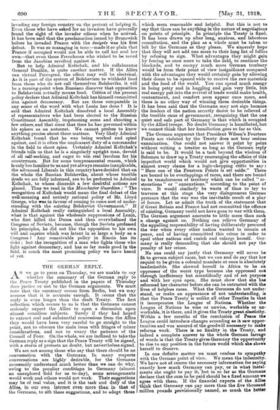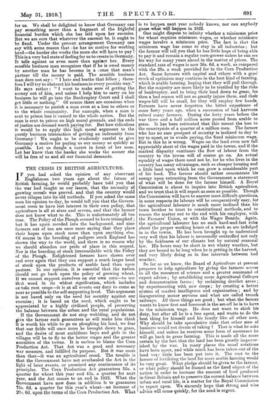THE GERMAN REPLY.
AS we go to press on Thursday, we are unable to say whether the summary of the German reply to the Peace Treaty published in the papers of Thursday does justice or not to the German arguments. We must note that the summary comes from Berlin, but we may assume that it is accurate enough. It seems that the reply is even longer than the draft Treaty. The first reflection which occurs to us is that the Germans cannot seriously expect the Allies to open a discussion upon almost countless subjects. Surely if they had hoped to extract real and substantial concessions from the Allies they would have been very careful to go straight to the point, not to obscure the main issue with fringes of minor considerations, and not to weary the patience of the Council of Four. On the whole, we are inclined to take the German reply as a sign that the Peace Treaty will be signed, with a storm of protests no doubt, but nevertheless signed.
We are not among those who say that there should be no conversation with the Germans. In many respects conversations are highly desirable, for the Germans necessarily understand much better than we can do why; owing to the peculiar conditions in Germany (almost an unexplored field for us to-day), some arrangements would work and others would not work. Their suggestions may be of 'real value, and it in the task and duty of the Allies, in our own interest even more than in that of the Germans, to sift these suggestions, and to adopt those which seem reasonable and helpful. But this is not to say that there can be anything in the nature of negotiagons on points of principle. In principle the Treaty is fixed. It has been drawn up after long, anxious, and laborious consultation, and the plan as a whole must be taken or left by the Germans as they please. We sincerely hope that they will not add one more to their long list of follies by refusing to sign. What. advantages they might gain by forcing us once more to take the field, to continue the blockade, and to occupy much more German territory would be from- their point of view insignificant compared with the advantages they would certainly gain by allowing their doors to be opened wide to receive the raw material: and the food of the world. You can spend much energy in being petty and in haggling and gain very little, but real energy put into the revival of trade would make health, contentment, and comfort soon appear once more, and there is no other way of winning these desirable things. It has been said that the Germans may not sign because the leaders of the nation secretly desire to be relieved of the terrible onus of government, recognizing that the one quiet and safe part of Germany is that which is occupied by the Allied troops. No doubt Germany is humiliated, but we cannot think that her humiliation goes so far as this.
The German argument that President Wilson's Fourteen Points are violated by the Treaty does not bear serious examination. One could not answer it point by point without writing a treatise as long as the German reply is said to. be. It would be. a task beyond the wisdom of Solomon to draw up a Treaty rearranging the affairs of this imperfect world which would not give opportunities in almost every clause for a logic-chopping critic to say " Here one of the Fourteen Points is set aside." There are bound to be overlappings of races, and there are bound to be transferences of territory which can be called "re- storations " or " annexations.' according to the point of view. It would similarly be waste of time to try to traverse at this stage the very disingenuous German pretence that the war was the inevitable result of a play of forces. Let us admit the truth of the statement that if Great Britain and France had not committed the offence of existing, Germany could not have gone to war with them. The German argument amounts to little more than such a charge against us. Nothing can relieve Germany of the appalling responsibility of having deliberately procured the war when every other nation wanted to remain at peace, and of having committed this crime in order to spoil other nations and enrich and enlarge herself. Ger- many is really demanding that she should not pay the penalty of her crime. No one could say justly that Germany will never be fit to govern subject races, but we can and do say that her requist to be given a colonial mandate at once is absolutely inadmissible. She showed herself in Africa to be an oppressor of the worst type because she oppressed not through inefficiency but scientifically and of set purpose and with her eyes open. She must show that she has reformed her character before she can be entrusted with the liven of helpless races. What the Germans do not under- stand, or make an appearance of not understanding, is that the Peace Treaty is unlike all other Treaties in that it incorporates the League of Nations. Whether the League of Nations be wise or unwise, workable or un- workable, it is there, and it gives the Treaty great elasticity. Within a few months of the conclusion of Peace the
League could introduce changes according as it saw oppor- tunities and was assured of the goodwill necessary to make
reforms work. There is no finality in the Treaty, and indeed a complete answer to the whole German farrago of words is that the Treaty gives Germany the opportunity to rise to any position in the future world which she shove herself to deserve.
In one definite matter we must confess to sympathy with the German point of view. We mean the indemnity. We have not of course the necessary information for saying exactly how much Germany can pay, or in what instal- ments she ought to pay it, but in so far as the Germans declare that the sum to be paid should be a fixed amount we agree with them. If the financial experts of the Allies think that Germany can pay more than the five thousand million pounds provisionally named, so much the better for us. We shall be delighted to know that Germany can pay something more than a fragment of the frightful financial burden which she has laid upon her enemies. But we are sure that whatever the amount be, it ought to be fixed. Under the present arrangement Germany can say with some reason that he has no motive for working hard—the harder she works the more she will have to pay I This is a very bad state of feeling for us to create in Germany. It tells against us even more than against her. Every sensible business man recognizes that if he is owed money by another man he has become in a :ewe that man's partner till the money is paid. The sensible business man does not say " I hate and loathe that fellow ; there- fore I will try to obstruct his business in every possible way." He says rather : " I want to make sure of getting the money out of him, and unless I help him to carry on his business he will go into the Bankruptcy Court and I shall deb little or nothing." Of course there are occasions when it is necessary to punish a man even at a loss to others or to the whole community. For example, when a man is
sent to prison loss is to the whole nation. But the man is sent to prison on high moral grounds. and the ends of justice are deemed worth paying for. But how ridiculous it would be to apply this high moral argument to the purely business transaction of getting an indemnity from Germany 1 We ought to be studiously careful to give Germany a motive for paying us our money as quickly as possible. Let us dangle a carrot in front of her nose. Let her know that the harder she works the sooner she will be free of us and all our financial demands.



































 Previous page
Previous page